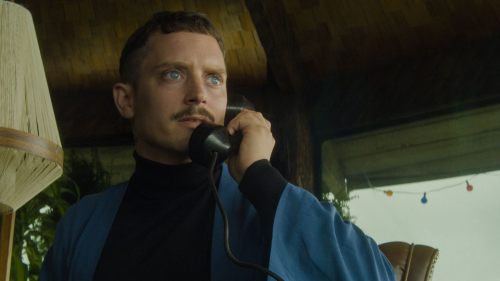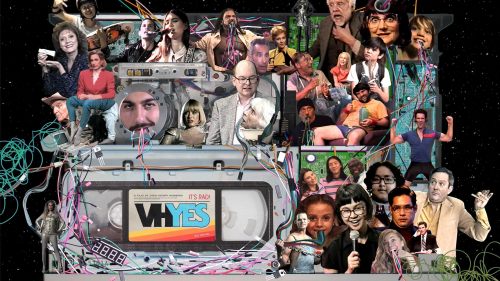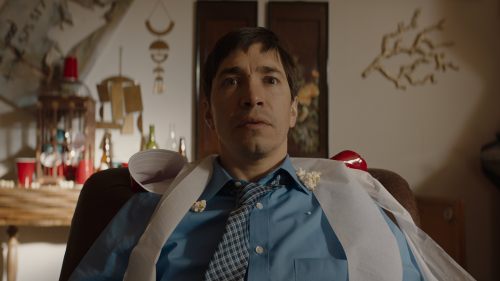Fantastic Fest Interview: Luke Shanahan And Adelaide Clemens On RABBIT
Luke Shanahan's debut feature Rabbit premiered at Fantastic Fest this month. You can check out my review of the surreal and visually stunning film here. While at the festival I had the opportunity to chat with Shanahan and star Adelaide Clemens about the beautiful locations where they filmed in Australia, the grainy '70s inspired visuals, and the fascinating female characters.
As both writer and director did any of the images we see in the final film come to you while writing the screenplay? Were you picturing specific locations where you wanted to film?
Luke Shanahan: Yeah, totally. I guess knowing that I was going to direct it, I wrote it as a director, which sometimes you're told not to but I just couldn't avoid it. All the things you see in the film, like the steady cam shots, that was all written. That tree at the start, which is extraordinary.
It's beautiful.
Shanahan: Ironically, that's a big wedding photography place. It's just outside Adelaide about half an hour out in the National Park and it's where couples go in the white gown and this beautiful old dead tree in the middle of this forest. So, I definitely wrote with the image of the places, the looks - I basically wrote a shooting script alongside the real script so I had a palette of colors. All the detail in the film was completely planned through the script phase and the colors, the primary color being the red in the start and the bookends, down to the dresses and the designers. So, it was very detailed.
So, are you always a visual writer?
Shanahan: Yeah. Which is funny cause when you look at the body of my short work (The News, Pet, First Date) it's all dialogue heavy. But the last few years my work has moved across into more visual stuff, yeah. It's what I'm intrigued by more and I wanted this to be beautiful. A lot of long shots, a lot of master shots, I wanted a lot of muted colors.
I love the color palette. It adds a very '70s aesthetic and vibe to the film. What inspired you to set it during that time period?
Shanahan: It's not really locked into a time period at all, but you're dead right. The films that I'm into whether it be Polanski or just the horror, even the American horror through that time, it really just seems scarier. I love that whole de-saturated graininess.
Was there a particular film that influenced the story?
Shanahan: I had a friend and she said, "I reckon if my twin was getting tortured I'd feel it." And I thought that was an incredible thing for somebody to say and then I thought, okay, well, in a life threatening event could you reach out for help and she said, "Absolutely, I'd hear her." So, it came from that and then it came from the images of twins, which are creepy.
Speaking of the twins, can you talk a little about the themes of duality in film?
Shanahan: There are two halves of the film. I would say the first half is American and the second half is almost European. It starts off kind of a conventional road movie, I mean it's still a bit kooky up front. I just figured that the two halves of the film, essentially, the second half is Cleo the first half is Maude.
We obviously spend a lot more time with Maude and during the moments with Cleo she's always in distress. What was your approach to giving each twin their own identity and personality?
Adelaide Clemens: Well, what initially drew me to the project was, once we started researching I wanted to know how much of this could be factual. Do people test on twins? And once I started looking at that I realized that all around the world it's very common that they look at twins for medical and scientific experiments. I also looked into the psychology of twins, especially an identical twin, and the most interesting point is in their teens/early twenties when every teenager wants to differentiate themselves. So, imagine trying to differentiate yourself from someone who was identical to you! So, yeah, I mean that was just so fascinating to me. So, for me, with Maude and Cleo I think they totally misunderstand each other and I think that was a huge part of why there was a rift in their relationship. I created a whole backstory based on their sensibilities. Cleo is more outgoing and more social and more fearful and insecure about her own intelligence and her own ability to do something, as Maude is less social but has this kind of burning knowledge, this brilliant mind.
Shanahan: She's incredible. There wasn't a big physical differentiation for her to base the performance on. She got there with the subtlest of - there are little elements in the room at the start, one half of the room is academic awards and sports trophies. So she had to get there with very little proppage around her and obviously not having scenes together. She had to create Cleo as being sort of this wildly tempestuous one and Maude being more introverted. She sort of knew it straightaway. She's not an actress that's like, "Luke, what's my motivation?" We talked about the characters at the start of each take and she might say, "What's it missing. What do I need?" And I'd throw a word at her or something.
Another character I found fascinating was Nerida (Veerle Baetens). While I was quick to label her as the villain, the more I think about her the more layered she becomes.
Shanahan: Veerle brought so much to that role that I don't even think was there on paper. She's made it so much better and we collaborated, because it was a little bit of a two dimensional baddie to start with. She always had this backstory, but Veerle made you have empathy for that character.
What do you hope audiences will take away from the film when they see it?
Adelaide Clemens: Well, I hope they take away the talented genius of Luke Shanahan, because I think he's a really, really brilliant director. I think he's carved out something very unique in this film. I'm so excited for Luke. I'm so excited for Alex [Russell] too. I think his performance is amazing. And then for the story itself, you know, this is an Australian film but we deliberately wanted to depict a different visual landscape for the world. A lot of people think that Australia is all desert and it's not, it's very urban. I think in genre it's definitely worth playing with it and subverting it in different ways and I think that's really fun.
What's up next for you?
Shanahan: I'm looking at two projects out of the states and one in Australia. I've never directed anything I haven't written so I'm getting sent some scripts now, which is nice. This film has sort of opened up a lot of doors in that respect. I like the idea of collaborating too. I want to get back directing. I've got the buzz now.



